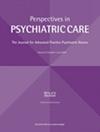The Relationship between Healthy Lifestyle, Self-Esteem, and Subjective Vitality in the Older Adults of Sirjan
IF 1.9
4区 医学
Q2 NURSING
引用次数: 0
Abstract
Older adults are a vulnerable group and face a series of problems that are preventable by changing their lifestyle, so it is necessary to understand the healthy lifestyle and its related factors in older adults. This study aimed to determine the relationship between healthy lifestyle, self-esteem, and subjective vitality in the older adults of Sirjan. This descriptive-analytical cross-sectional study included 200 older adults referred to community health centers in Sirjan in 2021. Older adults with inclusion criteria were selected by two-stage cluster sampling. Data were collected by demographic information questionnaire, the healthy lifestyle questionnaire for elderly, the Rosenberg self-esteem scale, and the subjective vitality scale. The data were analyzed using SPSS20 and descriptive and inferential statistics (Mann–Whitney U test, Kruskal–Wallis, post hoc tests, and Spearman correlation coefficient). A significance level <0.05 was considered. The study results showed that the mean scores of healthy lifestyle, self-esteem, and subjective vitality were 134.42 ± 13.78, 36.34 ± 4.62, and 21.80 ± 2.85, respectively. We observed a direct and significant relationship between healthy lifestyle, self-esteem, and subjective vitality ( ). Considering the relationship between healthy lifestyle, self-esteem, and subjective vitality in older adults, managers and planners can help older adults to promote their healthy lifestyles.新疆老年人健康生活方式、自尊和主观活力的关系
老年人是一个弱势群体,他们面临的一系列问题是可以通过改变生活方式来预防的,因此了解老年人的健康生活方式及其相关因素是很有必要的。本研究旨在确定锡尔詹老年人的健康生活方式、自尊和主观活力之间的关系。这项描述性分析横断面研究包括2021年在锡尔詹社区卫生中心转诊的200名老年人。采用两阶段整群抽样的方法选取符合入选标准的老年人。采用人口统计信息问卷、老年人健康生活方式问卷、Rosenberg自尊量表和主观活力量表收集数据。使用SPSS20和描述性和推理统计(Mann-Whitney U检验、Kruskal-Wallis检验、事后检验和Spearman相关系数)对数据进行分析。考虑显著性水平<0.05。研究结果显示,健康生活方式、自尊和主观活力的平均得分分别为134.42±13.78、36.34±4.62和21.80±2.85。我们观察到健康的生活方式、自尊和主观活力之间存在直接且显著的关系(p <0.001)。考虑到老年人健康的生活方式、自尊和主观活力之间的关系,管理者和计划者可以帮助老年人促进健康的生活方式。
本文章由计算机程序翻译,如有差异,请以英文原文为准。
求助全文
约1分钟内获得全文
求助全文
来源期刊
CiteScore
5.00
自引率
4.30%
发文量
139
审稿时长
>12 weeks
期刊介绍:
Perspectives in Psychiatric Care (PPC) is recognized and respected as THE journal for advanced practice psychiatric nurses. The journal provides advanced practice nurses with current research, clinical application, and knowledge about psychiatric nursing, prescriptive treatment, and education. It publishes peer-reviewed papers that reflect clinical practice issues, psychobiological information, and integrative perspectives that are evidence-based. Perspectives in Psychiatric Care includes regular columns on the biology of mental illness and pharmacology, the art of prescribing, integrative perspectives, and private practice issues.

 求助内容:
求助内容: 应助结果提醒方式:
应助结果提醒方式:


